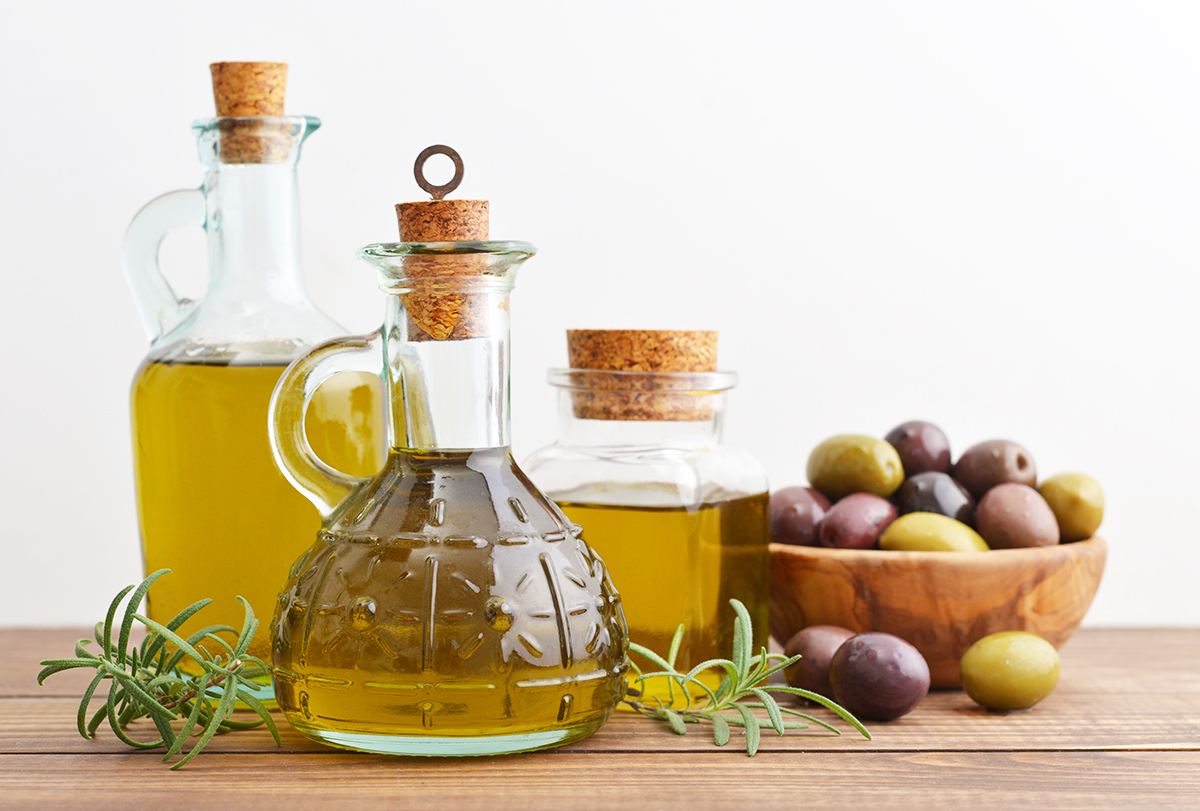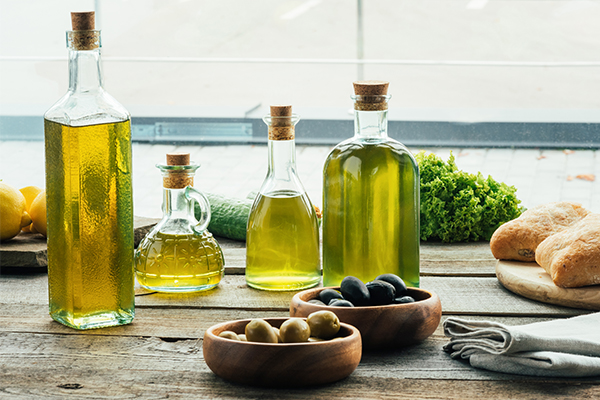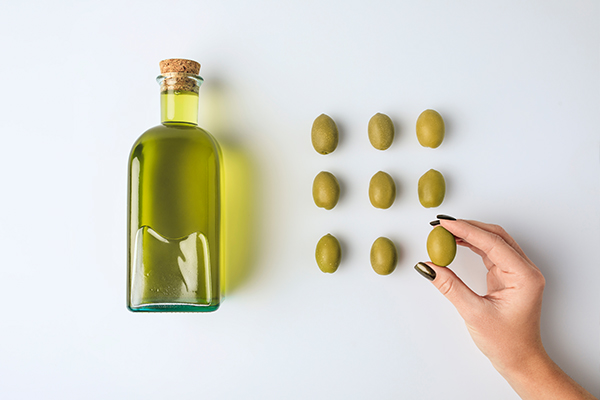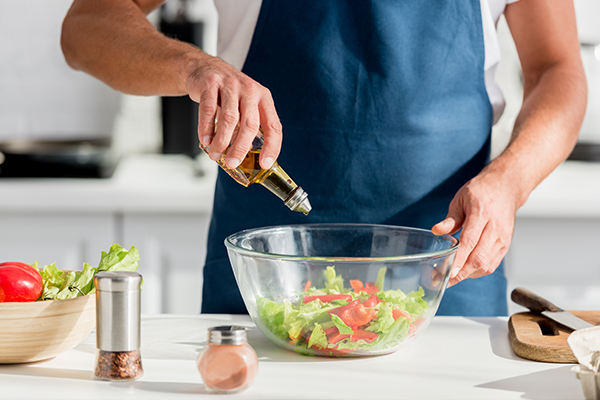In this article:
Olive oil is a common constituent of the Mediterranean diet and is known to help boost general health and prevent some diseases.

Olive oil is full of fats and antioxidants. Also, the flesh of olives contains around 3% of phenolic substances such as esters and glucosides.
Nutritional Value of Olive Oil
Olive oil is the natural oil that is extracted from olives. It is very calorically dense, containing around 120 calories per tablespoon of pure fat, which means it contains no protein or carbohydrates.
About 14% of olive oil is saturated fat, and 11% is polyunsaturated fat (omega-3 and omega-6 fatty acids). The remainder is a monounsaturated fat called oleic acid.
Olive oil also contains many antioxidants and an abundant amount of vitamins E and K. (1)
Different Varieties of Olive Oil

Olive oil is classified into the following types depending upon its refining process, smoke point, and other relevant factors:
1. Extra virgin olive oil
EVOO is produced naturally and is unrefined, making it the best choice if you are looking for all the health benefits. It retains all the antioxidants since it is the least processed and is made without heat and chemicals.
2. Virgin olive oil
Virgin olive is just like EVOO and is an unrefined oil since it is not made with heat or chemicals. Its antioxidant profile is almost identical to that of EVOO, but it has a lower flavor intensity. It also has a higher smoke point, which means it can be used for higher-temperature cooking than EVOO.
3. Refined olive oil
Refined olive oil is more processed than the naturally extracted EVOO, losing its antioxidant benefits. It also does not have the flavor panel of olive oil and is mostly used for deep frying.
4. Pure olive oil
This is a blend of extra virgin olive oil and refined olive oils.
5. Light olive oil
The name can be confusing as people usually think of fewer calories when they see the word “light” in food. However, the “light” in light olive oil refers to its mild flavor.
Light olive oil is a mix of refined olive oil and other vegetable oils. It is used to cook food without the dominant olive oil flavor.
Health Benefits of Olive Oil

Consuming olive oil in recommended amounts can help improve your health in the following ways:
- Oleocanthal, an antioxidant in olive oil, helps reduce chronic inflammation and, in turn, protects against many diseases. (2) Inflammation has been linked to many diseases, including cancer, heart disease, metabolic syndrome, type 2 diabetes, Alzheimer’s disease, and arthritis. The oleic acid in olive oil can also reduce inflammatory markers.
- Olive oil is loaded with antioxidants that reduce the risk of diseases, fight inflammation, and protect cholesterol from oxidation, thus lowering the risk of heart disease or atherosclerosis. (3)
- The monounsaturated fats found in olive oil have been linked to a reduced risk of stroke.
- Olive oil helps lower LDL cholesterol levels. (4)
Healthy Ways to Consume Olive Oil
There are many different ways to incorporate olive oil into the diet. Switching your saturated fat intake with monounsaturated fatty acids has many health benefits and can be done with simple swaps.
- Instead of sautéing vegetables in butter or processed oils, use extra virgin olive oil.
- Drizzle olive oil on top of your salad in place of salad dressing.
- Use olive oil in marinades for fish, poultry, and meat.
- Make pesto sauce using EVOO and drizzle it on pasta.
- Use olive oil in place of butter when baking.
- Use olive oil as a dip for bread in place of butter or margarine.
Olive Oil Makes for a Healthy Cooking Oil
Olive oil can be used in everyday cooking in place of butter or other oils such as vegetable oil. Extra virgin olive oil is the most recommended as it is of high quality and unrefined.
Using olive oil to sauté vegetables can not only add monounsaturated and polyunsaturated fats to your diet but can also help your body absorb fat-soluble vitamins, namely, vitamins A, D, E, and K.
Olive Oil Help for Cholesterol Control
Research shows that olive oil does help reduce cholesterol levels, specifically LDL or the “bad” cholesterol, due to its high levels of monounsaturated fats. (4)(5)
In fact, when monounsaturated fatty acids replace saturated fat in the diet, LDL and total cholesterol can drop by 6%–10%. Monounsaturated fats have no effect on HDL or good cholesterol.
The omega-3 polyunsaturated fats in olive oil also help decrease LDL cholesterol levels and can increase good HDL cholesterol levels.
Skin Benefits of Olive Oil
Olive oil is known to have many benefits for the skin.
Studies show that applying olive oil to the skin can prevent signs of aging due to its antioxidants and an ingredient called squalene, which is known for its hydrating effect. (6)(7)
Squalene can be used to moisturize the under eye and soften the cuticles for nail growth.
Using Olive Oil as a Hair Oil
Olive oil has been known to be used in hair masks. It can add shine and moisture to the hair and can repair damaged hair and split ends. The belief that your hair will become stronger and healthier from olive oil application comes from the high quantity of vitamin E in olive oil.
Vitamin E is an antioxidant that can repair damaged hair follicles and encourage healthy hair growth.
Olive Oil and Weight Gain

Olive oil is very nutrient-dense, which means it is high in calories for just a small amount. Just like anything in excess, excessive consumption of olive oil can lead to weight gain.
Olive oil in moderation is a great addition to the diet and has many health benefits. If you are mindful of portion control, olive oil can be used regularly without causing any weight gain. (8)
Comparative Benefits of Olive Oil and Olives
Olive oil and olives are both known to be healthy because they are high in monounsaturated fats. Although they may sound the same, the two are very different when it comes to their nutrient profile.
Olive oil is made up of 100% fat, making it a lot more nutrient-dense. On the other hand, olives are about 20% fat and contain much fewer calories per serving size.
Moreover, olives are pickled, making them contain a lot of sodium compared to olive oil, which is free of sodium. During the pickling process of olives, the naturally occurring polyphenols may be removed (polyphenols are phytonutrients that protect against disease).
Lastly, olives provide a small amount of fiber that olive oil does not. Both olive oil and olives have their own nutritional benefits and can be consumed in a healthy diet.
Side Effects of Olive Oil
Excessive use of olive oil can have certain unwanted side effects. If used excessively on the skin, olive oil can cause acne by clogging pores and trapping dirt.
Olive oil is high in calories, so consuming it in excess can also lead to unwanted weight gain and diarrhea. However, using olive oil daily in a healthy amount does have some good side effects as well.
Olive Oil Allergy
Although an olive oil allergy is rare, it is possible to suffer from one. If you are allergic and you ingest or come in contact with olive oil, you may experience contact dermatitis, eczema, or respiratory allergies.
Final Word
Olive oil is highly popular for its various health benefits. While multiple studies support the use of olive oil, it should be used in moderation due to its high-fat content, which can be harmful when consumed in excess.
- Was this article helpful?
- YES, THANKS!NOT REALLY


